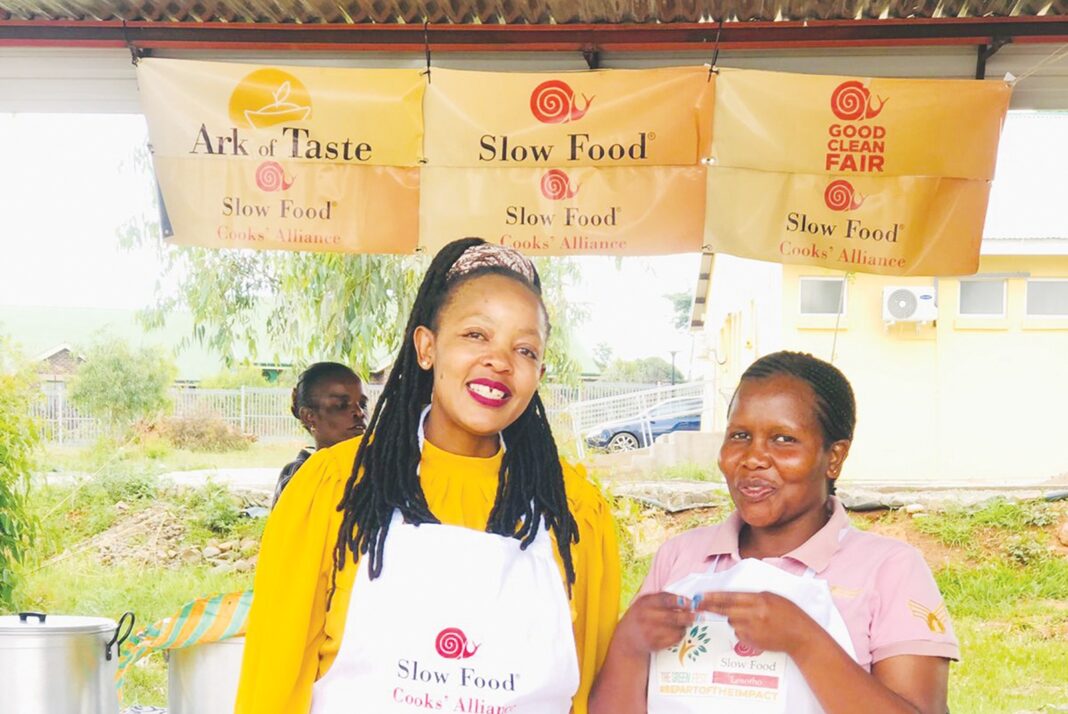By Matṧeliso Phulane
Sekamotho Moteane, famously known as ‘Ska’, has urged that it is high time that people start fighting for their bodies and take responsibility to eat slow food which is good, clean and healthy.
Slow Food in Lesotho is a non-governmental organization founded in Italy in by Carlo Pertrini. It was launched in Lesotho in 2014 with an aim to encourage people to eat healthy food stuff by avoiding consuming fast foods.
In an interview with theReporter this week, the coordinator of Slow Food Lesotho Moteane indicated her team try by all means to avoid genetically modified food.
Some of the mouth-watering foods they prepare are sorghum salad with onion, mixed with robot peppers as well as diced pumpkin. In one plate there are also green vegetables which are a mix of amaranth leaves, stinging nettle, pumpkin leaves, spinach and spring onion. Besides that, there is also a piece of free range chicken as that is rich in protein.
“To add flavor to our food we do not use any type of spices or colorants; rather, we use herbs naturally that are produced such as rosemary, parsley, oregano and basil produced by farmers. On chicken, we only add salt because it already has its own divine taste.
“Since 2014 when Slow Food in Lesotho began our team has been working hard to reach every corner of the country in making people aware of preserving our traditional food and recipes for future. And therefore we cannot achieve that without the help of farmers,” Moteane said.
She added that as Slow Food, they encourage people to avoid fast food outlet which is readily available food that people do not even know how and when they were produced and processed.
Ska explained that both fast food and slow food taste different.
“Slow Food taste is different because it takes long to be processed and therefore the food has a good taste and healthy. In contrast, one may find that most of the fast food restaurants chefs normally add more spices to nourish the food’s flavour.
“For instance, if the chicken has to grow at least 12 to 18 months particularly free range chickens we let it grow the way it was supposed to grow, instead of using injections artificial for speedy growth.
“Such chickens are not kept in the cage, they get the sun and they get fresh water that is why we advise people to eat such,” she added.
In terms of crops, Moteane explained that they use food which took their longest term to grow naturally until they are mature enough to be consumed, unlike those which take a shorter period of time after being fed with chemicals and fertilizers.
She explained that most of the people nowadays have various illnesses and they do not also make it to the elderly age, “because of not eating healthy food, hence they made decision as slow food to see how things were done tradition.”
Speaking about the challenges encountered with her team, Ska said they already knew of the resistance they would face from potential consumers.
“Nowadays people depend on food advertised on televisions and social media platforms which give them an impression that our tradition is of sub-standard and those appearing on screen are fancy and delicious therefore they deserve to eat them,” Ska expressed.
She again highlighted that most of the people grew up having a mindset that eating traditional food means they are poor which is not the case. As a result, it becomes difficult for them to change such mindsets.
She said apart from television and internet culinary schools also fail to teach chefs about African Cuisines which some of them are considered French cooking and all the Western styles of cooking which are the top modules to qualify for the certificate.
Ska also mentioned that staple food such as sorghum and beans which they need for cooking are not easily accessible because there are some places which are hard to reach and that discourages people to eat healthy as they wish.
She urged the new government to assist farmers who produce their organic products in remote areas with transportation in order to access the products easily.
In few years to come, Ska explained that through Slow Food Cooks Alliance, they are hoping to inspire chefs in order for them to open restaurants which specialise in local food to attract tourists as there are no such restaurants in the country.
An award winning chef, entrepreneur, author and advocate for local cuisine, chef Ska was born in Thaba-Tseka district.
Having inherited her passion for cooking from her mother, she proceeded to study Culinary Arts in Johannesburg, South Africa. When perparing her menus, Ska bases everything on what she can source locally. She also now worked as a freelance consultant.
She aspired to train people in Culinary Arts with the specific aim of instilling a sense of appreciation of nutritious local food in her students. She has 20 years experience in cooking industry.
Apart from cooking, she is a successful author with her book Cuisine of the Mountain Kingdom storming to the Best African Cookbook in the World award at the Gourmand World Cookbook Awards in 2012 held in Paris France.
The cookbook documents a number of traditional Sesotho recipes which had never before been available in print. In recognition of her work, Moteane was recently invited by Slow Food International to attend an International Food Expo in Torino, Italy in October 2014.
Moteane said anyone is welcome to join Slow Food Cooks Alliance and for more details they can visit their Face book page, Instagram and Linked in on their website: www.slowfood.com









